In a bid to stimulate job creation and entrepreneurship, Union Finance Minister Nirmala Sitharaman’s budget proposal on July 23, 2024, has garnered varied reactions from industry leaders. The proposed reimbursement of EPFO contributions and a comprehensive skilling program targeting 20 lakh youth over five years have been lauded for their potential to drive employment. Additionally, the abolition of the Angel tax is seen as a significant boost for the startup ecosystem. However, the securities markets face challenges with increased taxes on capital gains and transactions, raising concerns among investors.
Here’s how industry experts reacted to the budget
Suhas Misra, Co-CEO & Co-Founder, Channelplay

Very excited to learn of the plan to reimburse EPFO contributions to drive employment. This initiative is expected to generate jobs and have a high impact, especially focusing on skilling in the budget. During the budget Finance Minister mentioned that about 20 lakh youth will be skilled over 5 years, and there will be job creation in manufacturing with incentives at a specified scale related to EPFO contributions. Also good to note the focus on skilling.
We believe that an Open Network for Skill Development (ONSD), similar to ONDC, could be the way forward to unlock value in the private sector in terms of job creation. Allocating more resources for skill development is a good idea anyway and it will definitely make an impact in the sector.
A. Gururaj, Managing Director, Optiemus Electronics Ltd
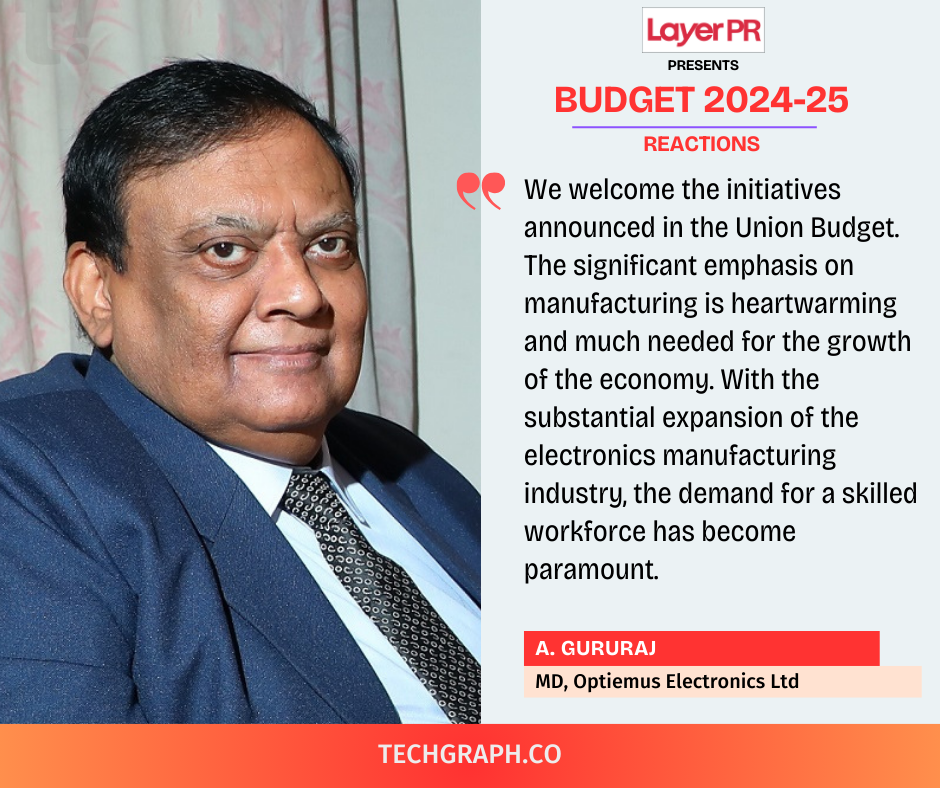
We welcome the initiatives announced in the Union Budget. The significant emphasis on manufacturing is heartwarming and much needed for the growth of the economy. With the substantial expansion of the electronics manufacturing industry, the demand for a skilled workforce has become paramount. The announcement of various skilling initiatives and the scheme to incentivize additional employment in the manufacturing sector, particularly for first-time employees, will provide essential support to industries reliant on skilled workforce, especially in electronics.
Furthermore, the proposal to reduce the Basic Customs Duty on mobile phones, mobile PCBA, and mobile chargers to 15% is a positive step. The measures laid out to support the MSME industries in particularly welcome to create a much-needed supplier base for electronics within India. These measures collectively send out a strong message to the manufacturing sector and related ecosystem in India.
Vikas Singh, Co-Founder, NFTFN

The 2024 Budget presents a mixed outlook for the startup community. On a positive note, the abolition of the Angel tax is a significant development that has been warmly received by founders and angel investors. This change is expected to provide a substantial boost to the entrepreneurial ecosystem in India. The budget’s emphasis on digital public infrastructure and the digitalization of the economy is another favorable aspect for tech startups focused on developing large-scale applications for the Indian market.
However, the securities markets face less encouraging news. The increase in short-term capital gains tax from 15% to 20%, alongside the rise in long-term capital gains tax from 10% to 12.5%, and the hike in the Securities Transaction Tax (STT) on Futures & Options (F&O) transactions, are anticipated to negatively affect investors. The immediate reaction from the markets has been unfavorable.
In the cryptocurrency sector, there was an expectation that the government would align its taxation policy with other asset classes to foster growth and investment. Regrettably, this opportunity was not seized, marking a missed chance to further support startups and investors within the crypto space.
Amit Bansal, CEO, Solv
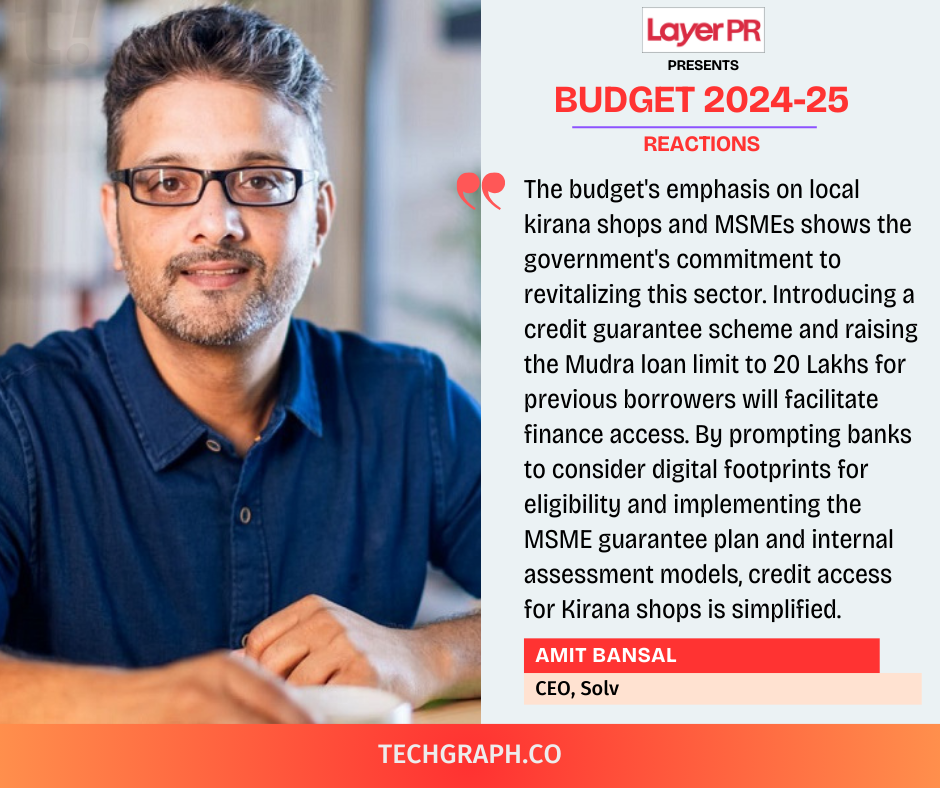
The budget’s emphasis on local kirana shops and MSMEs shows the government’s commitment to revitalizing this sector. Introducing a credit guarantee scheme and raising the Mudra loan limit to 20 Lakhs for previous borrowers will facilitate finance access. By prompting banks to consider digital footprints for eligibility and implementing the MSME guarantee plan and internal assessment models, credit access for Kirana shops is simplified. The collateral-free credit guarantee scheme and support for MSMEs in financial distress are crucial. Establishing export hubs and providing technological support will enhance global competitiveness and innovation for local Kirana shops.
Uday Chawla, Managing Partner, TRANSEARCH India
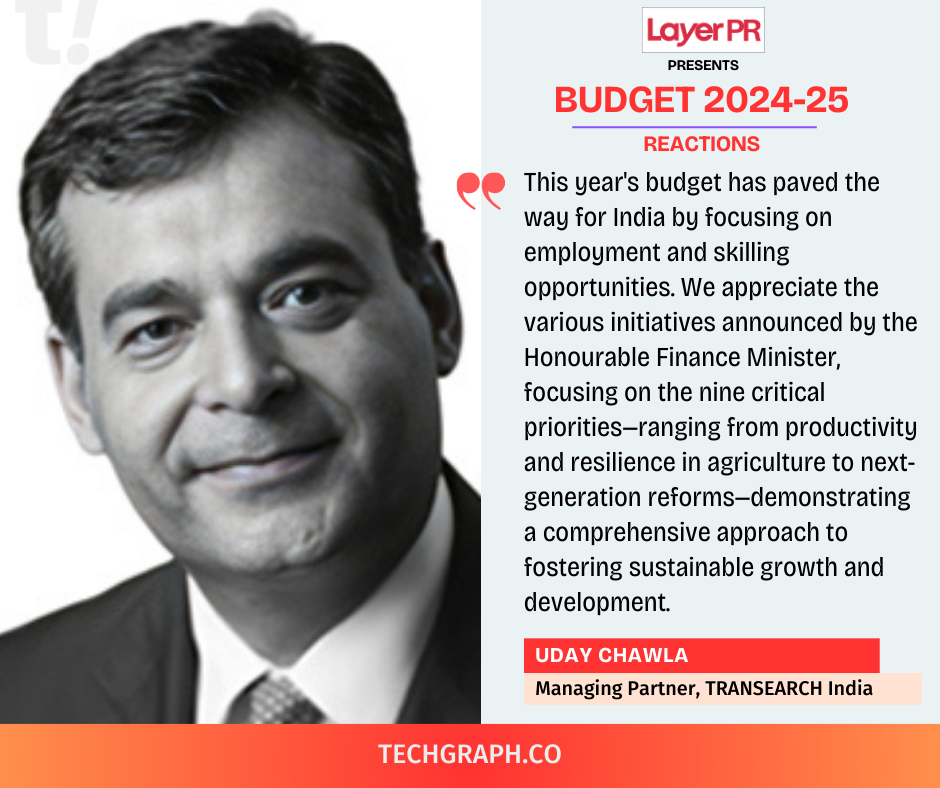
We welcome the Budget 2024-25 as a people-friendly and pro-development budget. This year’s budget has paved the way for India by focusing on employment and skilling opportunities. We appreciate the various initiatives announced by the Honourable Finance Minister, focusing on the nine critical priorities—ranging from productivity and resilience in agriculture to next-generation reforms—demonstrating a comprehensive approach to fostering sustainable growth and development.
For future leaders, these priorities offer a robust foundation to build upon and will create dynamic opportunities for innovation and leadership in these vital sectors. We believe that the budget, along with conducive policies and regulatory reforms, will facilitate research and development, and foster a culture of innovation, across sectors. With increased investment, the budget is poised to enhance employment opportunities and spur rising demand, especially for skilled leadership in these sectors.
Rohit Bansal, Chair, FICCI Startup Committee & Co-founder of Titan Capital & Snapdeal
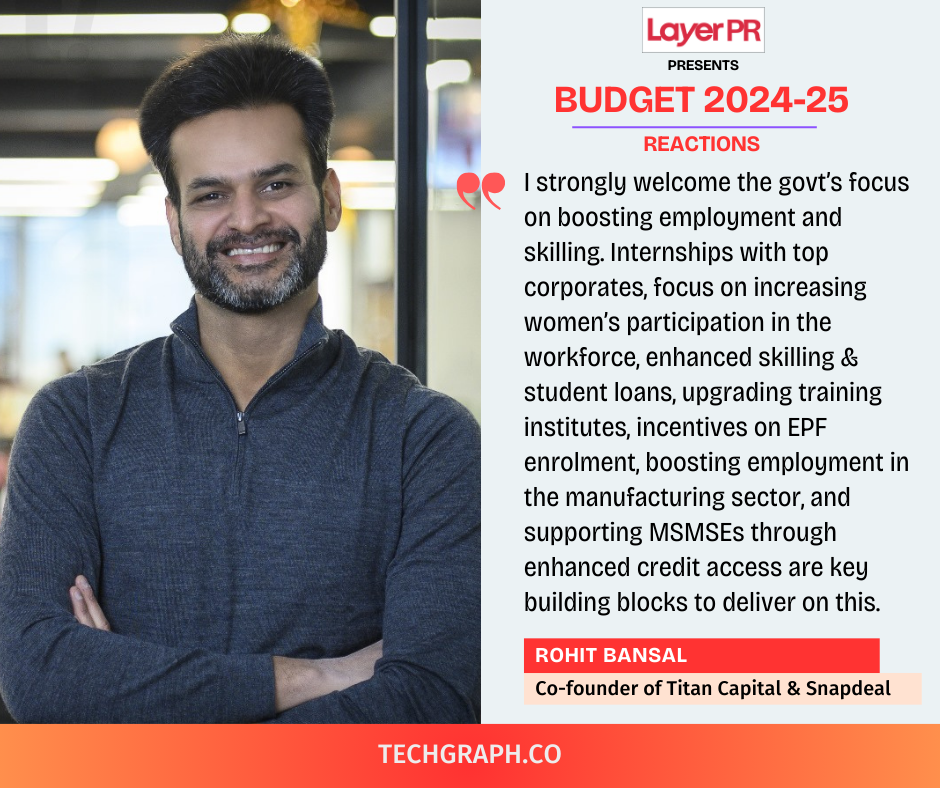
I strongly welcome the government’s focus on boosting employment and skilling. Internships with top corporates, focus on increasing women’s participation in the workforce, enhanced skilling & student loans, upgrading training institutes, incentives on EPF enrolment, boosting employment in the manufacturing sector, and supporting MSMSEs through enhanced credit access are key building blocks to deliver on this. As one of the fastest-growing economies with one of the youngest populations in the world, India has a unique opportunity. The Budget 2024 has both the big picture and the specific initiatives to propel India ahead.
Durvesh Yadav, Founder and CEO, Rising Star Communication

The budget presents a highly favorable system, with numerous opportunities for startups to gain scalability and drive business growth. Farming is one of the biggest and most diverse forms of business in India and the budget gives an opportunity for growing business of organic farming.
The funding of agricultural research will set the stage for the development of newer technologies and combined with the government’s plan to provide support to private players in the market, startups can leverage the opportunity to develop advanced agricultural tools, machinery, and techniques that improve productivity and sustainability for small-scale farmers.
Lowering of Basic Customs Duty on mobile phones and its components like chargers to 15% will directly benefit startups. This will enable them to take their output level up and lock horns in the competitive market efficiently, courtesy reduction in production costs.
The investment-ready plug-and-play industrial parks will mark a significant turning point. Along with the Credit Guarantee Scheme for MSMEs, it is all set to improve credit availability for MSMEs, solving the issue of fund crunch. Together, the budget schemes will be successful in cultivating a conducive environment for startups to survive as well as scale.
Nilaya Varma, Co-Founder & CEO, Primus Partners
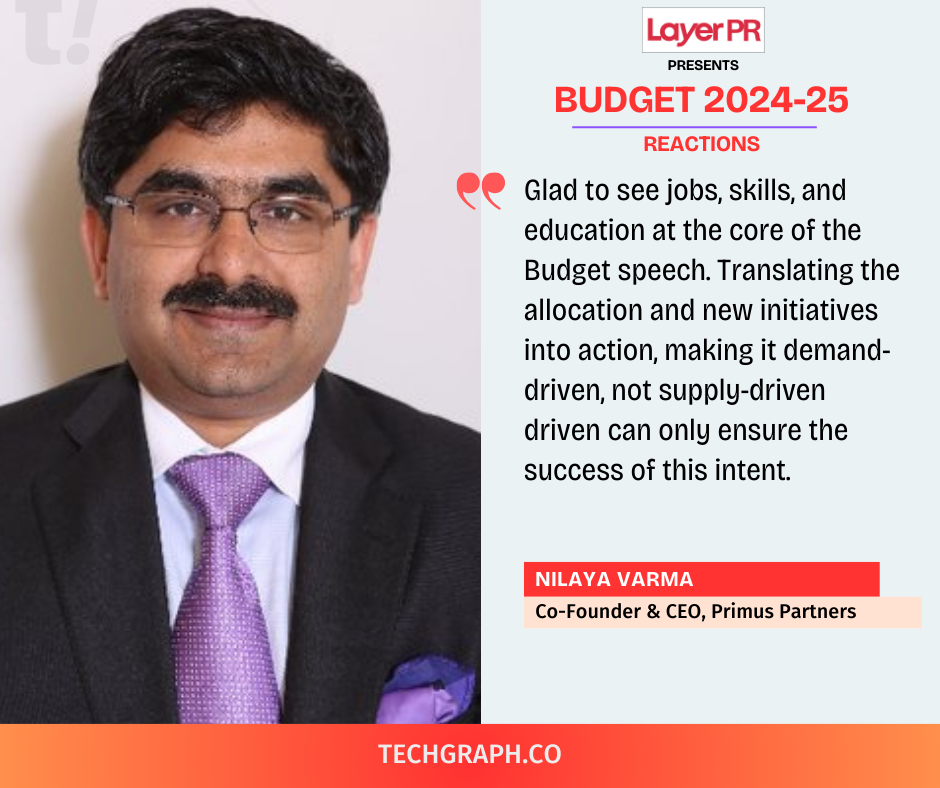
Jobs have to be at the core of economic growth. Glad to see jobs, skills, and education at the core of the Budget speech. Translating the allocation and new initiatives into action, making it demand-driven, not supply-driven driven can only ensure the success of this intent.
Ratna Mehta, Managing Partner, Fundalogical Ventures
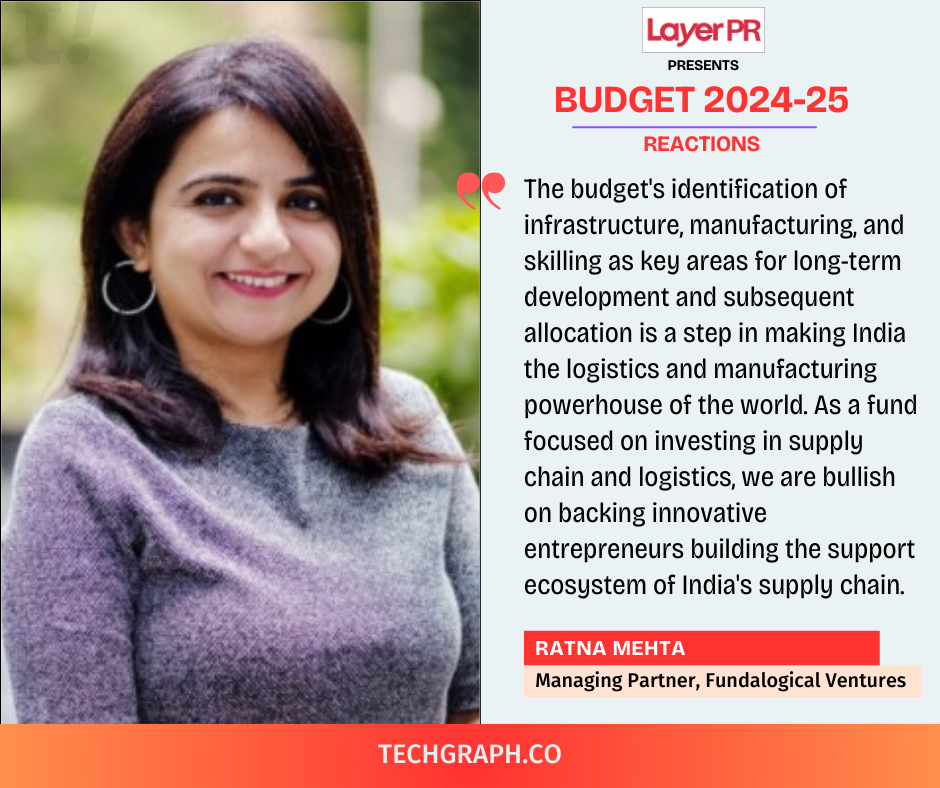
The logistics and supply chain is the lifeline of India’s growth story. The budget’s identification of infrastructure, manufacturing, and skilling as key areas for long-term development and subsequent allocation is a step in making India the logistics and manufacturing powerhouse of the world. As a fund focused on investing in supply chain and logistics, we are bullish on backing innovative entrepreneurs building the support ecosystem of India’s supply chain.
The government’s move to set up E-commerce export hubs to be set up for enabling MSMEs to export their local products is a huge step in the direction of driving growth through innovation and building on new-age trends to drive MSME growth. Interesting move from the Government to create industrial centers in historic hubs like Gaya of India as a part of ‘Vikas bhi, Virasat bhi.’ This will boost widespread infra development and logistics in these regions and create employment opportunities, reducing the urban-rural divide as well as encouraging the distribution of income.
Akshal Agarwal, Co-founder, NatureNurture
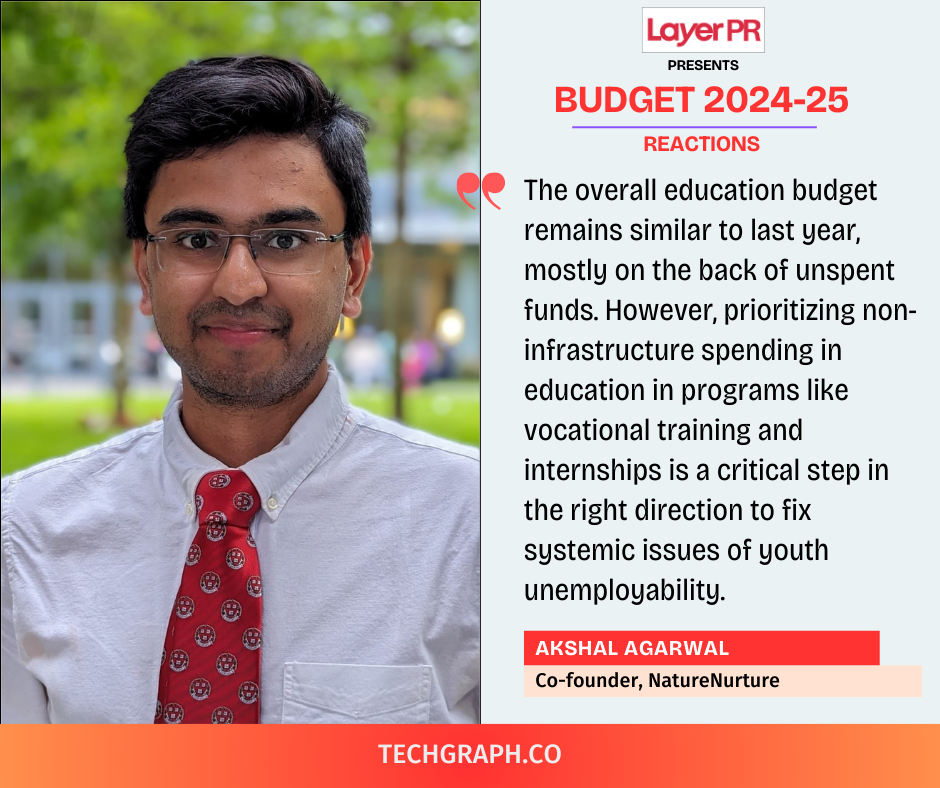
The Economic Survey’s unemployability survey showed only 1 in 2 graduates in India have the skills to be gainfully employed, which represents a huge demographic challenge. The budget has prioritized the upskilling of youth with the innovative internship program announced wherein the top 500 companies of India will provide internships to 1 crore youth over the next 5 years. The internship includes a one-time payment of INR 6000 towards relocation/accommodation and INR 5000 per month as a stipend for 12 months.
The companies are allowed to use their Corporate Social Responsibility funds to finance up to 10% of the cost of the internship program. This shows the government’s strong push to solve the skilling gap in the economy and to collaborate with the private sector to pave the path to employment for India’s growing youth. The overall education budget remains similar to last year, mostly on the back of unspent funds. However, prioritizing non-infrastructure spending in education in programs like vocational training and internships is a critical step in the right direction to fix systemic issues of youth unemployability.
Dr. Ashish Agarwal, Co-Founder & CTO, Weather Risk Management Services (WRMS)

Budget 2024-2025 marks a significant milestone towards a thriving and innovative agritech future, with a strong emphasis on climate resilience and adaptation. The introduction of 109 high-yielding, climate-resilient crop varieties and the comprehensive review of agricultural research for climate-smart seeds are substantial advancements for the sector.
The budget’s allocation of Rs 2.66 lakh crore for rural development and the promotion of digital infrastructure aligns well with our objectives. The focus on natural farming and the goal to engage one crore farmers in the next two years further support sustainable agriculture.
Additionally, the budget underscores the importance of collaboration among the government, private sector, and research institutions to drive innovation and scalable solutions. To fully harness this progress, increased investments in IoT, AI, and data analytics are crucial. These technologies will enhance climate risk assessment and response, providing real-time data and predictive insights to improve climate adaptation strategies and ensure more effective interventions. We are optimistic that these initiatives will drive economic growth and promote sustainable development.
Vishnu Vardhan, Co-founder & CEO, SML India (Hanooman)
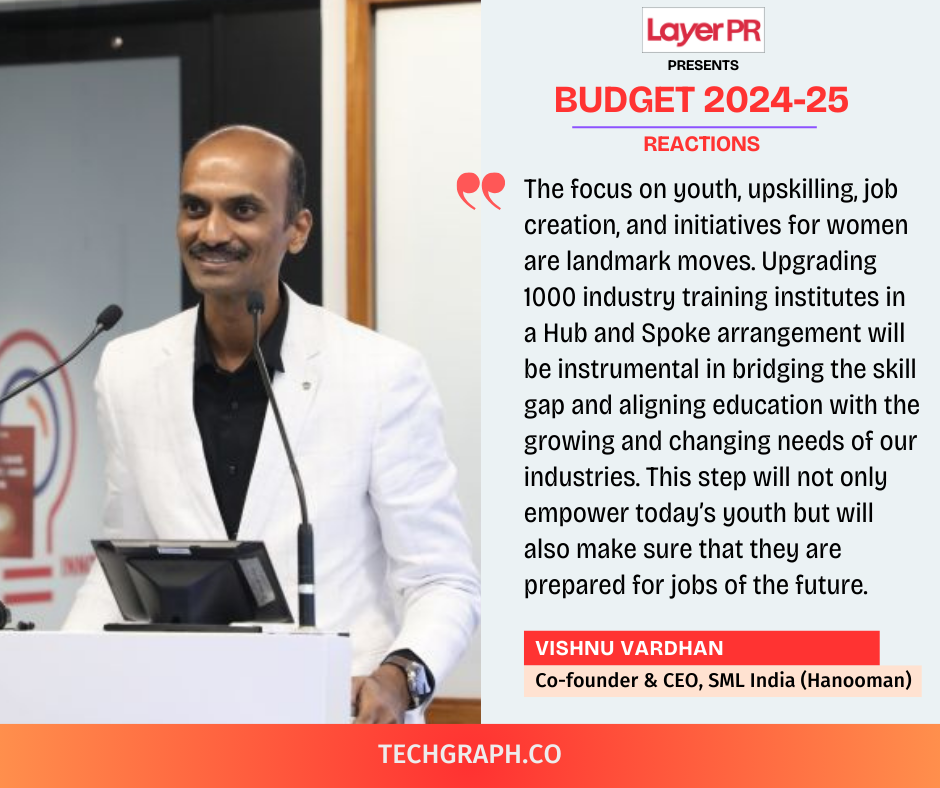
The budget truly reflects a forward-thinking approach, making way for a Viksit Bharat. The focus on youth, upskilling, job creation, and initiatives for women are landmark moves. Upgrading 1000 industry training institutes in a Hub and Spoke arrangement will be instrumental in bridging the skill gap and aligning education with the growing and changing needs of our industries. This step will not only empower today’s youth but will also make sure that they are prepared for jobs of the future. AI can also play a crucial role in upskilling our population and GenAI platforms like Hanooman which are available in multiple Indic languages can make sure that advanced AI tools and educational resources are available to people in every corner of our country in a language of their choice.
As a first-generation entrepreneur, I firmly believe that the announcement of the abolishment of the Angel Tax will further bolster the rising startup ecosystem of our country, further giving a boost to our entrepreneurial spirit. The establishment of the Anusandhan National Research Fund, with a financing pool of Rs 1 lakh crore, will propel private sector-driven research and innovation.
At SML India, we are excited about the new developments in this budget and we remain committed to leveraging emerging technologies like AI to support and enhance the transformative efforts of our government. Together, we can create a robust, inclusive, and technologically advanced future for India.
Meera Ramakrishnan, Director & Co-founder Zishta

Zishta wholeheartedly applauds the government’s visionary budget, which places a strong emphasis on rural development and skill development. The allocation of ₹2.66 lakh crore for rural development is a significant step towards empowering our artisans and craftsmen. We are particularly excited about the proposed e-commerce export hubs, which will provide a much-needed platform for MSMEs and traditional artisans like us to reach global markets.
The focus on developing 100 weekly haats is also commendable, as it will create new opportunities for artisans to showcase their products to a wider audience. Schemes like PM Swanidhi and MGNREGA have already proven effective in uplifting rural communities, and we believe that the government’s continued commitment to these initiatives will lead to a brighter future for India’s artisans. We are confident that these measures will not only revitalize rural economies but also contribute to preserving and promoting our rich cultural heritage.
Parimal Heda, Chief Investment Officer, Go Digit General Insurance

Floods are one of the most common natural disasters in India. Identifying key states, the government has taken strong steps towards flood mitigation. As systemic risks of floods get mitigated over time through various measures like flood-controlled structures, it will aid insurance companies in underwriting the risks related to liability and property insurance better going forward.
A new assessment model for MSME credit and the announcement of a credit guarantee scheme will also foster better insurance collaboration with lending companies and aid in better assessment of risks.
From an ancillary benefits point of view, the government’s proposal to boost domestic tourism and unlock the economic potential of key destinations will have an ancillary impact on travel insurance as well as boost its uptake as bite-sized travel insurance products will likely become part of travelers’ planning.
The government’s aim to prioritize agriculture research and developing climate-resilient varieties of 32 field and horticulture crops will also have an ancillary effect on the crop insurance segment as losses over medium- to long-term will likely reduce from loss of crop due to climate-related incidents. The Finance Minister’s financial sector vision and strategy document will also be another keenly watched policy by the BFSI sector to garner better insights on the agenda planned by the government for the remaining decade.
Anu Chaudhary, Partner and Global Head, ESG Consulting Practice, Uniqus Consultech

The 2024 budget sets nine priorities, with a clear path towards India’s 2070 Net-zero goal and sustainable agriculture. It prioritizes sustainability and climate resilience, aiming to impact the nation positively. It introduces ‘Natural Farming’ for one crore farmers, aided by scientific backing and local governance, alongside the establishment of 10,000 bio-input resource centers and the release of 109 climate-resilient crop varieties to support eco-friendly agriculture and productivity. This will go a long way in ensuring climate-resilient agriculture and the long-term sustainability of India’s food security.
The PM Surya Ghar Yojana targets free solar power for one crore households via roof-top solar panels. The broad interest shown by 1.8 crore registrations reflects a robust public inclination towards renewable energy. This will ensure energy self-sufficiency for households in India.
Additionally, the initiative to develop Bharat Small Reactors with the private sector signifies a move towards diversified and sustainable energy sources. Finally, creating a taxonomy for climate finance will also deepen the market for such products.
Chirag Mehta, Founder, Arbour Investments

The Union Budget 2024, unveiled by Finance Minister Nirmala Sitharaman, is a tapestry of ambitious reforms and strategic allocations aimed at propelling India’s economic landscape into a new era of growth and inclusivity. Central to this budget is the revision of the tax regime, which now features a more generous standard deduction of Rs 75,000, alongside a restructured tax rate system that promises significant savings for salaried individuals. The corporate tax rate for foreign entities has been notably reduced to 25%, fostering a more inviting environment for foreign direct investment. Additionally, the abolishment of the angel tax and the introduction of a unified tax exemption regime for charities reflect a progressive approach to taxation that seeks to stimulate philanthropic contributions and entrepreneurial ventures alike.
In a bid to enhance infrastructure and rural development, the government has earmarked a staggering ₹2.66 lakh crore for rural initiatives, including the construction of three crore additional houses under the PM Awas Yojana. The budget also emphasizes energy security and sustainability, launching the PM Surya Ghar Muft Bijli Yojana to provide free electricity to a million households through rooftop solar installations. Furthermore, a comprehensive scheme to support one crore youth with internships in top companies underscores the government’s commitment to job creation and skill development. As the budget unfolds, it is poised to not only invigorate the economy but also to weave a narrative of empowerment, particularly for women and marginalized communities, thereby laying a robust foundation for a more equitable future.
Sumit Shukla, Chairman, i-merit Steering Committee, Founder & CEO at Connexrm Pte Ltd (Singapore)

The Union Budget’s substantial allocation of Rs 1.48 lakh crore for education, employment, and skilling is a significant step forward in addressing India’s youth unemployment crisis. The government’s commitment to training 20 lakh young people over the next five years is commendable. To truly maximize the impact of these initiatives, it is crucial to focus on industry-aligned skill development, ensuring that the training programs equip young people with the specific competencies demanded by the job market. By fostering strong public-private partnerships, we can create a skilled workforce that drives economic growth and innovation.
Ashish Saraf, VP and Country Director, Thales in India
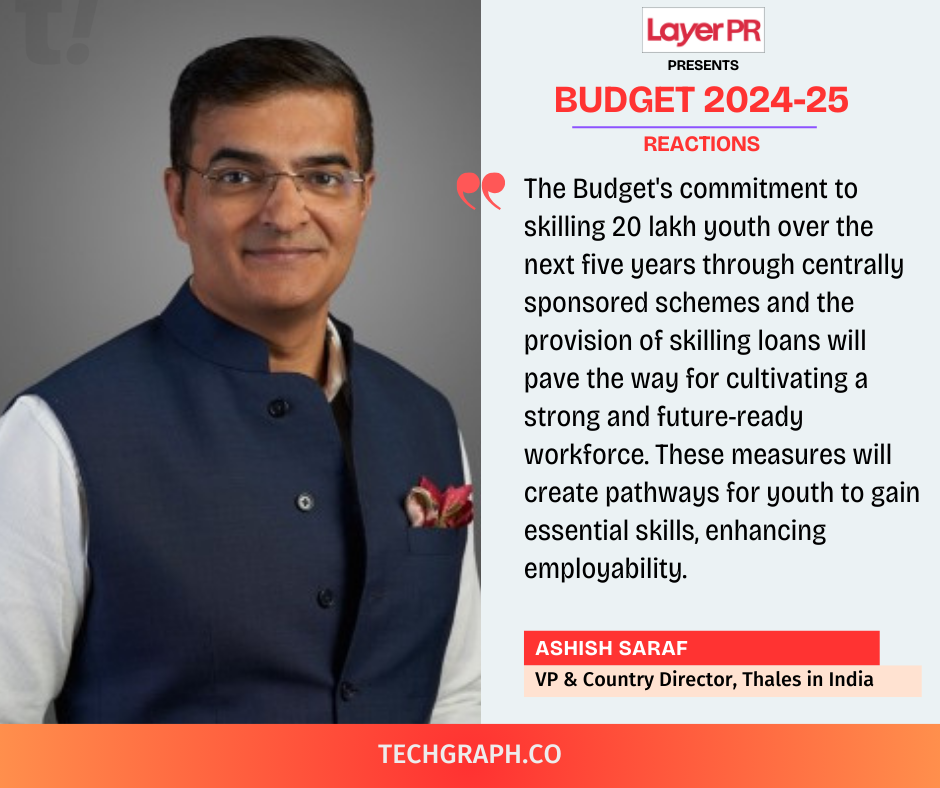
We applaud the government’s special emphasis on skilling, research, and innovation, complementing the ‘Viksit Bharat 2047’ vision, in the Union Budget 2024-25. The Budget’s commitment to skilling 20 lakh youth over the next five years through centrally sponsored schemes and the provision of skilling loans will pave the way for cultivating a strong and future-ready workforce. These measures will create pathways for youth to gain essential skills, enhancing employability. We also welcome the focus towards inclusive and holistic growth through a number of other announcements including employment-linked skilling schemes, internship opportunities to students in 500 top companies as well as the allocation of over ₹3 lakh crore to advance women’s roles.
Another key aspect of the budget is the establishment of the Powering Innovation, R&D Anusandhan National Research Fund. This will indeed provide a boost to private sector-driven research and innovation leading to the development of cutting-edge technologies in the country. We commend these visionary steps and are committed to supporting India in nurturing a highly skilled workforce and deep-tech innovations by leveraging our local and global expertise and experience.
Prateek N Kumar, Founder and CEO, NeoNiche Integrated Solutions

The recent Budget represents a comprehensive strategy aimed at fostering growth across various sectors of society. By focusing on employment, skilling, MSMEs, the middle class, the underprivileged, women, youth, and farmers, it presents a holistic and inclusive approach. The nine priorities outlined for the coming years—productivity and resilience in agriculture, employment and skilling, manufacturing and services, urban development, energy security, infrastructure, innovation, R&D, and next-generation reforms—underscore a commitment to well-rounded development. This emphasis on job creation and boosting consumption is set to significantly benefit the consumer goods, real estate, and automotive sectors. It’s an encouraging roadmap for our nation’s future.
Vishvanathan Subramanian, CFO & Director, PayMate
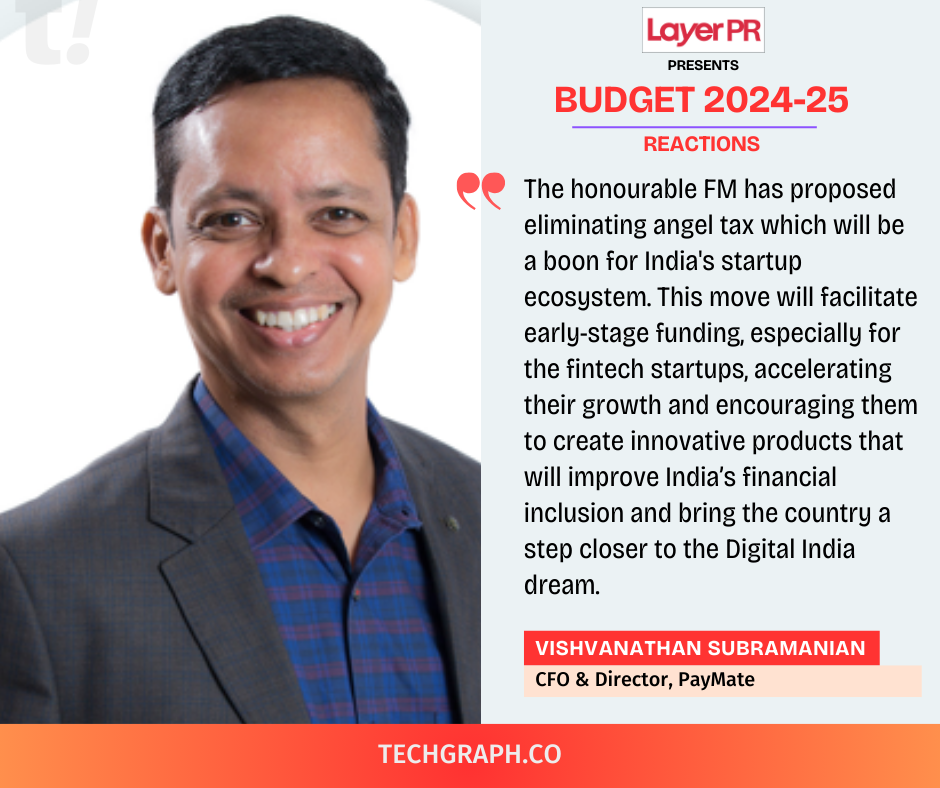
The government’s projection of a 4.9% fiscal deficit for the current year, with a target of 4.5% for the next, underscores its commitment to fiscal discipline. This strategic approach is expected to bolster investor confidence, attract FDI, and foster a conducive environment for economic growth in the coming years.
The honourable FM has proposed eliminating angel tax which will be a boon for India’s startup ecosystem. This move will facilitate early-stage funding, especially for the fintech startups, accelerating their growth and encouraging them to create innovative products that will improve India’s financial inclusion and bring the country a step closer to the Digital India dream.
MSMEs are the engine propelling the economy, credit is the essential fuel. And the credit to MSMEs without collateral is an outstanding move that will enhance access to much-needed capital, fostering growth for them. The self-financing guarantee fund of Rs 100 crore will help MSMEs cover their CAPEX needs without requiring collateral or a third-party guarantee.
The aggressive steps towards skilling and employment of the youth in India are applausive. A comprehensive scheme offering internships in 500 leading companies to one crore youth will significantly address the skill gap in Indian companies. The skilling initiatives announced today will make the nation’s youth more tech-savvy, thereby potentially reducing the skill gap in the fintech sector. By reducing employer costs, providing wage support, and providing direct incentives, the government will not only enhance their employability but also potentially accelerate economic growth by increasing consumption, driving formalization, and improving productivity.
Dhawal Jain, Co-Founder of Mave Health
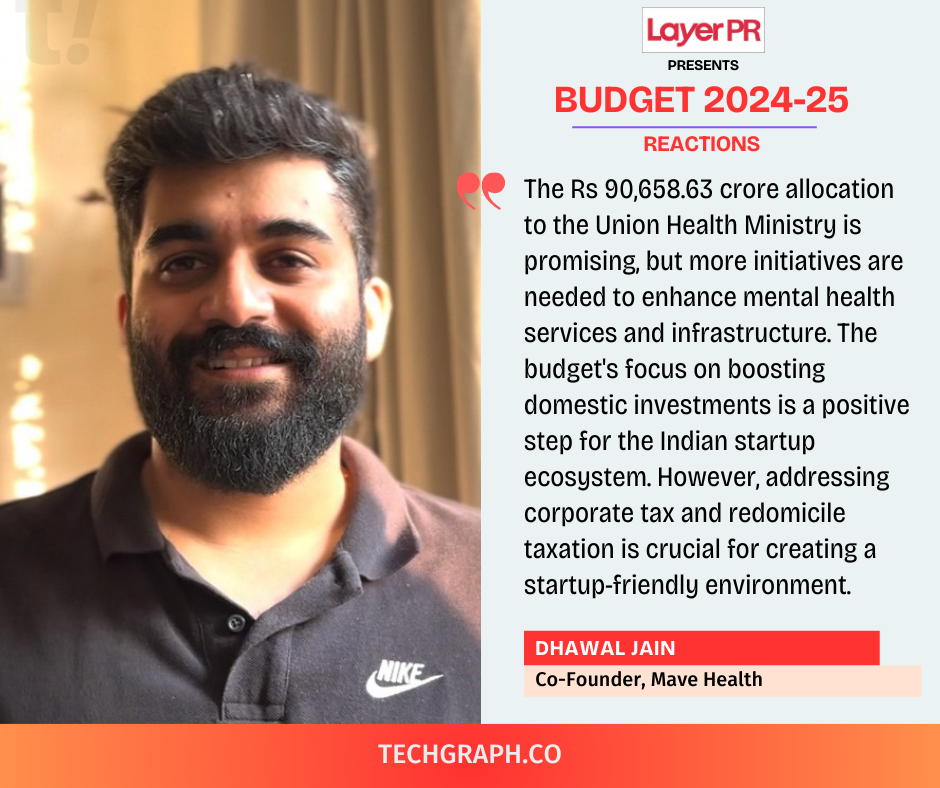
Mave Health appreciates the government’s forward-thinking Union Budget 2024-25, especially the collaboration with the private sector to develop small and modular nuclear reactors. This innovative approach is a great example for other industries, including healthtech.
The Rs 90,658.63 crore allocation to the Union Health Ministry is promising, but more initiatives are needed to enhance mental health services and infrastructure. The budget’s focus on boosting domestic investments is a positive step for the Indian startup ecosystem. However, addressing corporate tax and redomicile taxation is crucial for creating a startup-friendly environment.
The rise of startups in the BFSI sector, driven by innovations like UPI, highlights the potential of tech-driven solutions. We hope for continued government support for healthtech innovations, similar to the focus on new technologies in the nuclear energy sector.
We look forward to collaborative efforts that not only enhance the healthtech landscape but also ensure that startups like Mave Health can contribute meaningfully to the nation’s growth and well-being.
Ramanujam Komanduri, Country Manager, Pure Storage India
We welcome the Union Budget 2024 presented by the Finance Minister. The simplified tax structure and GST reforms show a strong commitment to ease of business, which is vital for us. The budget’s focus on employment, skill development, including programs for women, and promoting women-led initiatives highlights a commitment to diversity and economic participation.
The emphasis on developing DPI applications promises significant productivity gains and business opportunities across various sectors like credit, e-commerce, education, health, law and justice, logistics, MSMEs, and urban governance. This initiative is set to drive innovation in the private sector, reinforcing our commitment to advancing digital transformation and contributing to India’s technological growth.
Manikanth Challa, Founder & CEO, Workruit
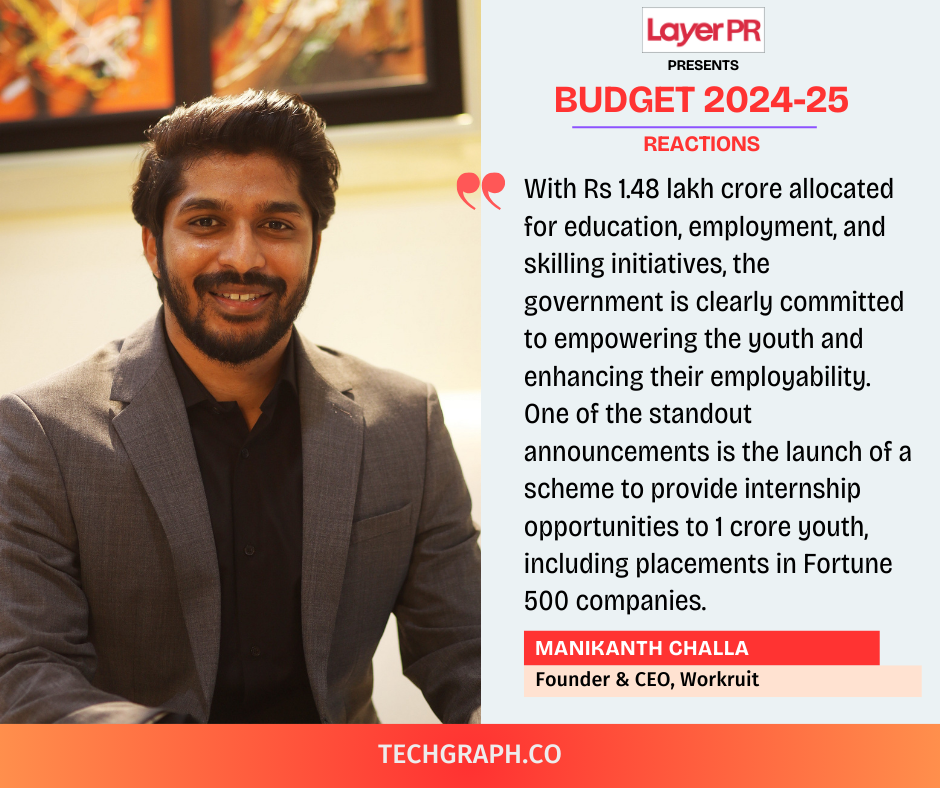
The Union Budget 2024-25 marks a significant advancement in the government’s approach to employment and skill development. With Rs 1.48 lakh crore allocated for education, employment, and skilling initiatives, the government is clearly committed to empowering the youth and enhancing their employability.
One of the standout announcements is the launch of a scheme to provide internship opportunities to 1 crore youth, including placements in Fortune 500 companies. This initiative offers invaluable industry exposure and practical experience, significantly boosting the employability of our young professionals.
The introduction of the three Employment-linked incentive schemes is a substantial improvement over last year’s broader initiatives. Scheme A’s Direct Benefit Transfer of 1-month salary up to Rs 15,000 for first-time employees registered in EPFO provides immediate financial support. Scheme B, which incentivizes job creation in manufacturing, offers direct benefits to both employees and employers, fostering industrial growth. Scheme C’s support to employers, with reimbursements up to Rs 3,000 per month for EPFO contributions for each additional employee, is a strong incentive for workforce expansion.
Upgrading 1,000 industry training institutes in a Hub and Spoke arrangement will bridge the skill gap and prepare youth for future jobs. The emphasis on women-led development and AI-driven upskilling for women highlights a commitment to gender equality and inclusive growth.
At Workruit, we are excited about these progressive measures and look forward to leveraging them to revolutionize India’s recruitment landscape through AI and digital tools.
Ankit Kumar, CEO, Skye Air Mobility
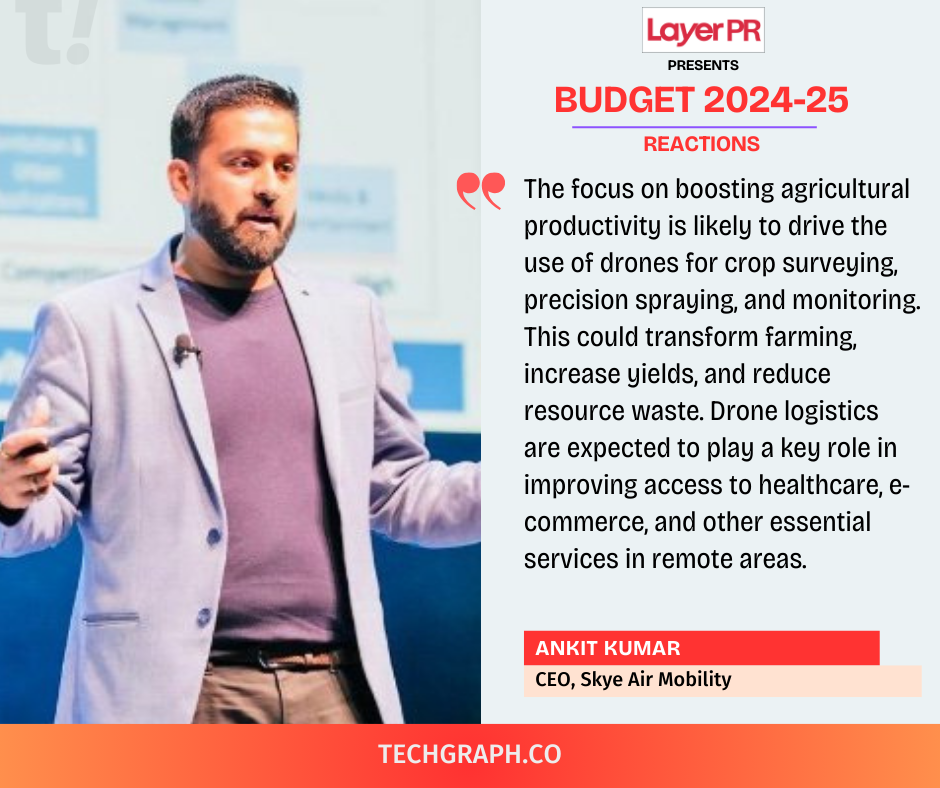
The budget presents big opportunities in agriculture, infrastructure, and deep tech sectors. The focus on boosting agricultural productivity is likely to drive the use of drones for crop surveying, precision spraying, and monitoring. This could transform farming, increase yields, and reduce resource waste.
The major infrastructure investment, especially in Northeast states, opens new doors for drone applications. Drone logistics are expected to play a key role in improving access to healthcare, e-commerce, and other essential services in remote areas. This aligns with the government’s goal of inclusive development and could greatly enhance the quality of life in hard-to-reach regions.
The budget’s emphasis on the deep tech sector is seen as a boost for innovation in drone technology. This could lead to advancements in AI, machine learning, and IoT integration with drones, enhancing their capabilities and expanding their uses. One of the most exciting prospects is using drones for transporting perishable goods. The industry expects that drone technology could cut perishable wastage by over 50%, tackling a major issue in India’s agricultural supply chain.
Dharamveer Singh Chouhan, Co-Founder & CEO, of Zo World
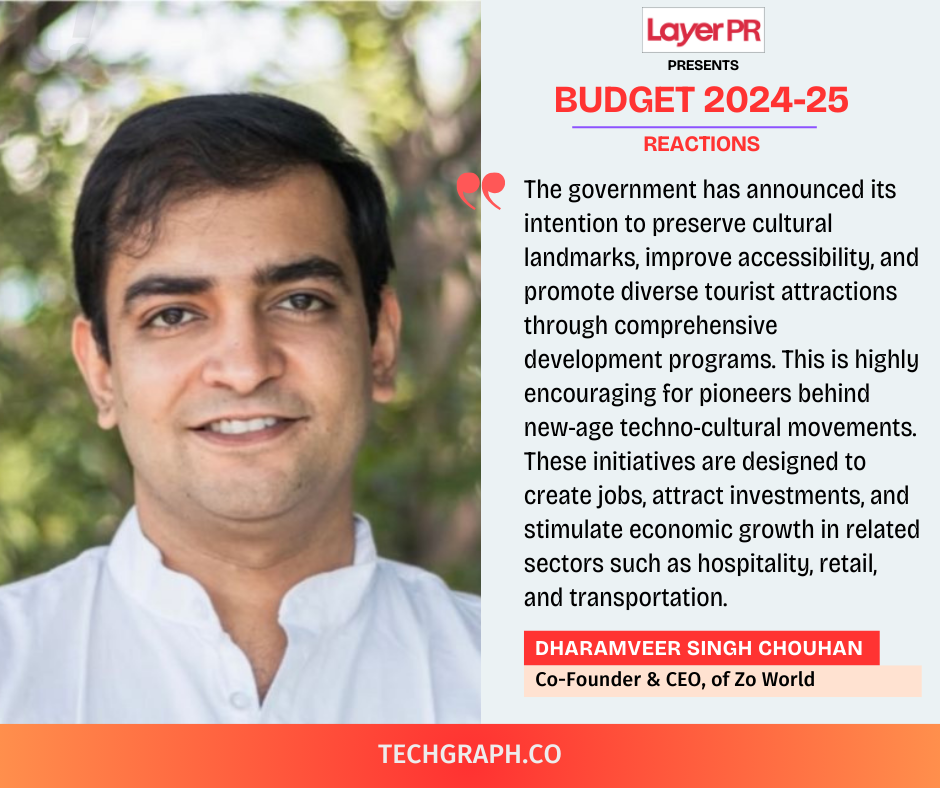
The Union budget for the Financial year 2024-25 marks a significant boost for the tourism industry, underscoring the government’s commitment to transform India into a preferred global destination for tourists. The budget has allocated substantial resources to developing and enhancing tourist infrastructure, including scenic landscapes, historic temples, cultural heritage sites, wildlife sanctuaries, and pristine beaches across the country.
The government has announced its intention to preserve cultural landmarks, improve accessibility, and promote diverse tourist attractions through comprehensive development programs. This is highly encouraging for pioneers behind new-age techno-cultural movements. These initiatives are designed to create jobs, attract investments, and stimulate economic growth in related sectors such as hospitality, retail, and transportation. The overarching goal is to leverage India’s rich cultural and natural heritage to drive sustainable tourism and enhance India’s position as a global superpower. The strategy also puts the spotlight on tourism as the industry that will enable both cultural preservation and long-term economic growth, while simultaneously championing the cause of diverse communities around the country.
These measures are commendable, and will undoubtedly boost confidence in both hospitality and tourism as lucrative startup sectors. At the same time, the Zo World community remains optimistic about enhancements that can propel this vision at least 10x, such as tax reductions for the hospitality industry (to encourage entrepreneurial strides in this direction), subsidies for startups that will contribute directly to the tourism sector, increased support for digital transformation in hospitality services, and additional funding allocation that will help market India’s diverse tourist destinations on the global stage.
Soumya Sarkar, Co-Founder, Wealth Redefine
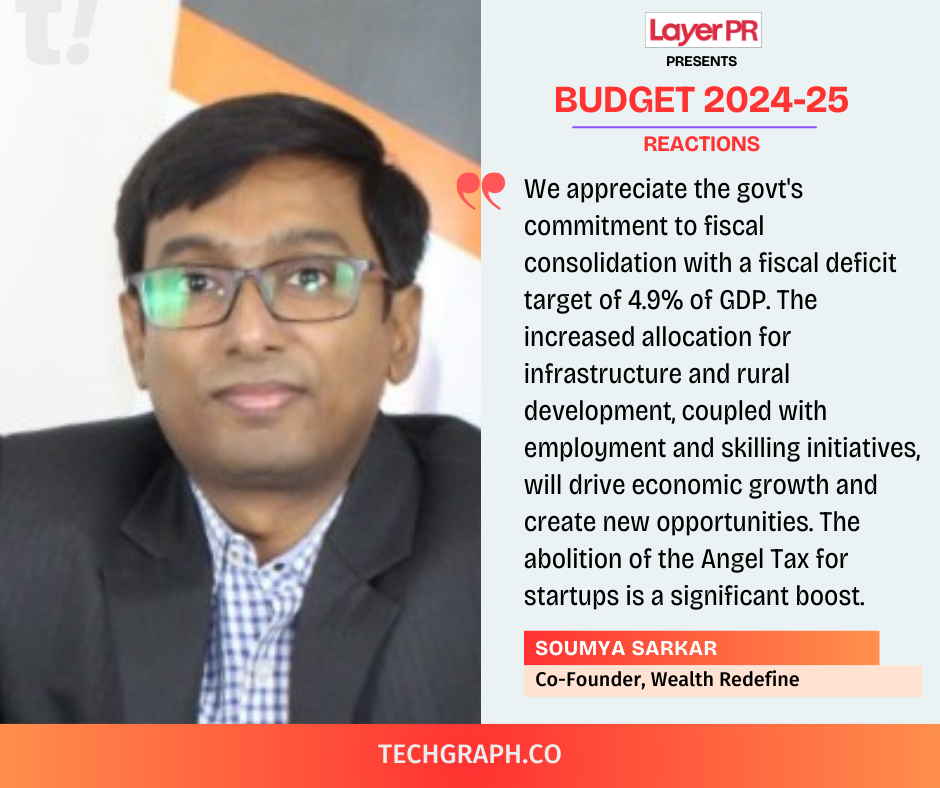
We appreciate the government’s commitment to fiscal consolidation with a fiscal deficit target of 4.9% of GDP. The increased allocation for infrastructure and rural development, coupled with employment and skilling initiatives, will drive economic growth and create new opportunities. The abolition of the Angel Tax for startups is a significant boost for the entrepreneurial ecosystem. At Wealth Redefine, we believe these measures will positively impact the investment climate.
However, the proposed tax hike on short-term and long-term capital gains may adversely affect the market. While the simplification of capital gains taxation is a positive step, the higher tax rates could dampen investor sentiment.
Shiva Dogra, Director, Wesoftek Solutions

The Union Budget 2024-25 has surely brought a visionary approach that suits the emerging landscape of the IT sector. The ending of the angel tax and reduction in corporate tax rates for foreign companies will push investment and innovation opportunities within our industry. Plus, simplifying FDI rules will promote the use of the Rupee for overseas investments is a strategic move that will enhance global partnerships and foster growth.
The budget focuses more on developing Digital Public Infrastructure and supporting MSMEs by enhancing credit guarantees as well as technology financing. With this, it empowers smaller tech firms. To keep up with the freshers, The internship scheme for youth and initiatives have been introduced to increase women’s participation in the workforce while promoting diversity.
I believe the budget 2024-25 is quite progressive as it offers numerous opportunities for IT companies to expand, contribute, and innovate in emerging India’s digital future.
Sunil Pathak, Founder & Chairman, We Chartered
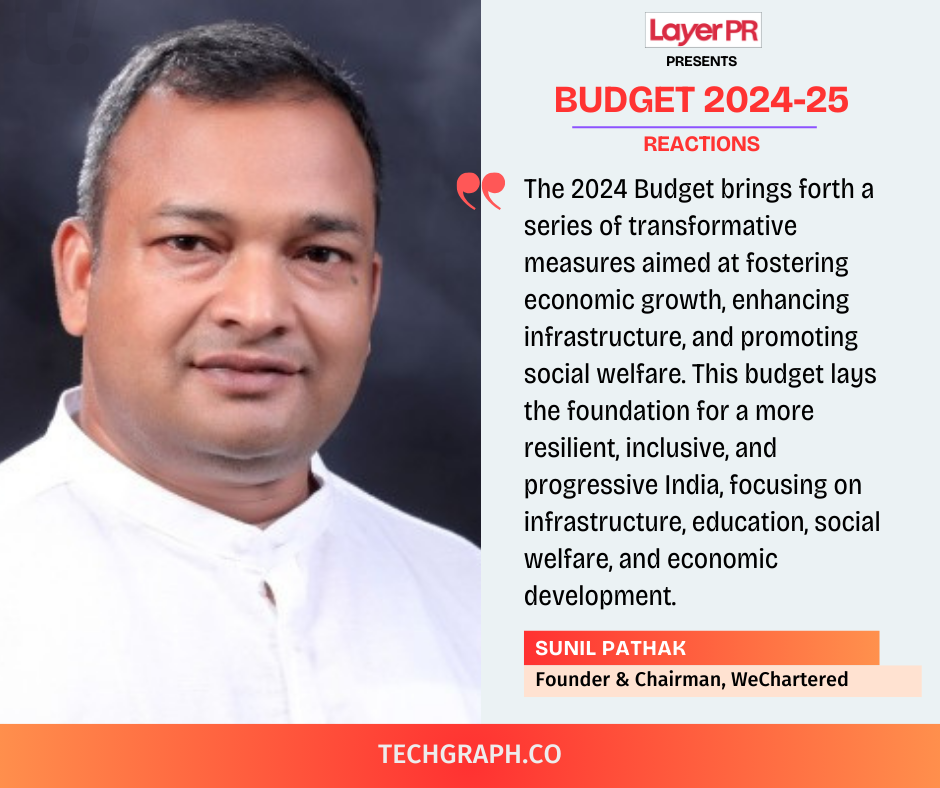
The 2024 Budget brings forth a series of transformative measures aimed at fostering economic growth, enhancing infrastructure, and promoting social welfare. This budget lays the foundation for a more resilient, inclusive, and progressive India, focusing on infrastructure, education, social welfare, and economic development.




